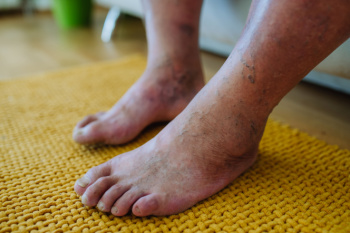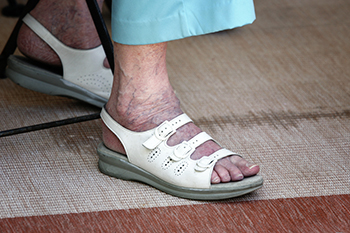Items filtered by date: June 2024
Recognizing Signs of Diabetes in the Foot

Diabetes can manifest in the feet through several noticeable signs. One common symptom is persistent numbness or tingling, often caused by nerve damage, known as diabetic neuropathy. This condition can lead to a loss of sensation, making it difficult to detect injuries or infections. Another sign is slow-healing sores or ulcers, which can develop from minor cuts or blisters due to poor circulation. Discoloration of the skin, such as redness, can indicate inflammation or infection. Swelling in the feet and ankles might also be present, signaling potential underlying issues. Additionally, changes in skin texture, including dryness or cracking, can occur. Fungal infections, particularly between the toes, are more frequent in diabetics. If you have diabetes, it is strongly suggested that you are under the care of a podiatrist who can help you manage this serious condition.
Diabetic foot care is important in preventing foot ailments such as ulcers. If you are suffering from diabetes or have any other concerns about your feet, contact one of our podiatrists from Carolina Foot & Ankle. Our doctors can provide the care you need to keep you pain-free and on your feet.
Diabetic Foot Care
Diabetes affects millions of people every year. The condition can damage blood vessels in many parts of the body, especially the feet. Because of this, taking care of your feet is essential if you have diabetes, and having a podiatrist help monitor your foot health is highly recommended.
The Importance of Caring for Your Feet
- Routinely inspect your feet for bruises or sores.
- Wear socks that fit your feet comfortably.
- Wear comfortable shoes that provide adequate support.
Patients with diabetes should have their doctor monitor their blood levels, as blood sugar levels play such a huge role in diabetic care. Monitoring these levels on a regular basis is highly advised.
It is always best to inform your healthcare professional of any concerns you may have regarding your feet, especially for diabetic patients. Early treatment and routine foot examinations are keys to maintaining proper health, especially because severe complications can arise if proper treatment is not applied.
If you have any questions please feel free to contact one of our offices located in Huntersville Office | 16419 Northcross Dr Suite A, Huntersville, NC 28078; Mooresvillle Office | 206 Joe Knox Avenue Suite D, Mooresville, NC 28117; and Mountain Island | 10310 Couloak Drive Suite 200, Charlotte, NC 28216 . We offer the newest diagnostic and treatment technologies for all your foot and ankle needs.
Geriatrics and Podiatry
Bone density loss, dry skin, poor circulation, and rough and brittle nails are some of the common problems that can occur as people age. The effect that these problems has on foot health should be of particular concern in comprehensive geriatric care.
Feet that are diseased or injured have a negative effect on overall health and safety. Painful feet limit a person’s willingness and ability to stay active. Poor foot health can also cause gait change, which can lead to falls and accidents. Even though recovery time from health problems naturally slows as we age, many foot problems can be avoided altogether with regular prophylactic care.
Feet should be thoroughly washed in warm water daily. Care must be taken to dry the feet well, making sure to dry between and under the toes. Any left-over moisture can cause problems like foot fungus. After cleaning feet carefully check for problems such as cracked skin, bruises, swelling, cuts, corns, or other irregularities.
Examine toenails for ingrown, jagged, or split nails. Long toenails should be cut straight across. Never cut toenails at an angle or down the side as this may lead to ingrown nails.
Cracked and dry feet should be treated once or twice a day with a non-greasy moisturizer. Rub the moisturizer into the skin and allow it to dry before putting on socks and shoes. Sweaty feet can be dusted with a small amount of talcum powder. Avoid putting talcum directly into shoes as this may make feet slip within the shoe and cause a serious fall.
Wear clean dry socks each day. Not only do clean socks feel better on the feet, but socks worn for longer periods may harbor disease and odor-causing bacteria. Socks should not be tight around the top as they can leave marks on the leg. Socks that are too small can bring about bruising caused by pressure against the toes.
Wear comfortable and well-fitting shoes. If possible, consult a professional footwear specialist when purchasing shoes. Do not walk around barefoot as this exposes the feet to possible injury and bacteria.
Good foot health allows a more active lifestyle, which improves blood flow. Good circulation aids in recovery from injury or illness. It is also important for maintaining overall health.
Serious health problems can manifest themselves as symptoms in the feet. The elderly should seek professional help from a podiatrist if experiencing foot problems like tingling, numbness, pain, infection, or a sore that does not heal. Taking care of these problems right away can prevent the development of severe cases.
Aging and the Feet
 As the aging population continues to grow, the need for specialized podiatric services in geriatrics is becoming increasingly critical. Older adults often face numerous foot and ankle issues due to years of wear and tear, decreased mobility, and chronic conditions like diabetes, arthritis, and circulatory problems. These issues can significantly impact their quality of life, leading to pain, decreased mobility, and a higher risk of falls and related injuries. Podiatric care is essential for the elderly to maintain their independence and mobility. Regular foot examinations can help prevent and manage conditions, such as bunions, corns, calluses, fungal infections, and foot ulcers. Proper foot care also aids in the early detection and treatment of serious complications such as peripheral neuropathy and poor circulation, which are common in older adults with diabetes. Preventative measures, routine care, and wearing appropriate footwear are vital components of geriatric podiatry services. If you are a senior, it is suggested that you schedule an appointment with a podiatrist for comprehensive foot health management, and to address any specific concerns you may have about your feet or ankles.
As the aging population continues to grow, the need for specialized podiatric services in geriatrics is becoming increasingly critical. Older adults often face numerous foot and ankle issues due to years of wear and tear, decreased mobility, and chronic conditions like diabetes, arthritis, and circulatory problems. These issues can significantly impact their quality of life, leading to pain, decreased mobility, and a higher risk of falls and related injuries. Podiatric care is essential for the elderly to maintain their independence and mobility. Regular foot examinations can help prevent and manage conditions, such as bunions, corns, calluses, fungal infections, and foot ulcers. Proper foot care also aids in the early detection and treatment of serious complications such as peripheral neuropathy and poor circulation, which are common in older adults with diabetes. Preventative measures, routine care, and wearing appropriate footwear are vital components of geriatric podiatry services. If you are a senior, it is suggested that you schedule an appointment with a podiatrist for comprehensive foot health management, and to address any specific concerns you may have about your feet or ankles.
If you need your feet checked, contact one of our podiatrists of Carolina Foot & Ankle. Our doctors will attend to all of your foot and ankle needs and provide you with quality treatment.
Geriatrics and Podiatry
When people age, some common issues that may occur are bone density loss, dry skin, poor circulation, and rough brittle nails. These issues may also affect your foot health if the necessary steps are not taken to alleviate the problems.
It is important to take care of your feet because feet that are injured or diseased can affect your overall health. Having painful feet hinders your ability to do daily activities or may decrease your willingness to do the things that you need to do.
Visiting Your Geriatrician
As we age, health problems become more likely, so it is essential to visit your doctor for check-ups to ensure that you are doing the best you can to take care of your health. It is recommended to check your feet frequently for any possible cuts, bruises, swelling, corns or any other irregularities.
Taking Care of Elderly Feet
Cracked or dry feet can be treated by applying moisturizer often. It is also important not to wear old socks because the older the sock is, the higher the possibility there will be that there is bacteria there. Wear fresh socks and make sure they fit properly.
Proper foot health means that you can have a more active lifestyle and you will not be bogged down by pain. Foot health also leads to good circulation, which is paramount for overall health.
If you have any questions, please feel free to contact one of our offices located in Huntersville Office | 16419 Northcross Dr Suite A, Huntersville, NC 28078; Mooresvillle Office | 206 Joe Knox Avenue Suite D, Mooresville, NC 28117; and Mountain Island | 10310 Couloak Drive Suite 200, Charlotte, NC 28216 . We offer the newest diagnostic tools and technology to treat your foot and ankle needs.

